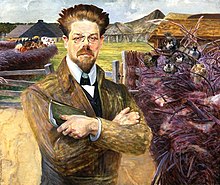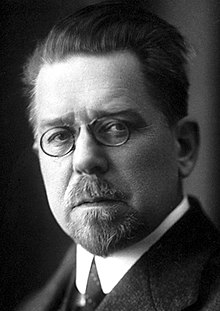Wladyslaw Reymont
Władysław Stanisław Reymont , actually Stanisław Władysław Rejment , also Władysław Reymont (born May 7, 1867 in Kobiele Wielkie near Radomsko ; † December 5, 1925 in Warsaw ) was a Polish writer, prose writer and novelist and one of the main exponents of realism (with influences from the naturalistic ). He belonged to the Młoda Polska (Young Poland) movement . In addition to his main works, his estate also includes poems. In 1924 he was awarded for his four-volume, divided by seasons novel The farmers the Nobel Prize in Literature .
Life

Władysław Reymont's father Józef Rejment was a cantor at a parish where he was also responsible for civil status records and the pastor's correspondence with the Russian authorities. His mother Antonina (née Kupczyńska) came from the Kraków nobility ; she was ascribed great narrative talent. Reymont refused his parents' wish to become cantor as well. He finished school prematurely, changed job and place of residence several times and traveled a lot through Poland and Europe . He graduated from the Warsaw Sunday School for Craftsmen. From 1880 to 1884 he did an apprenticeship as a tailor in Warsaw. From 1882 he wrote his first poems.
From 1884 to 1888 he worked as an actor in local traveling troops, then (from 1888 to 1893) he was employed as a subordinate employee of the Warsaw-Vienna Railway . He worked u. a. in Rogów and Lipce . In 1890 his mother died. In 1894 Reymont settled in Warsaw as a writer and lived from his literary activity.
On July 13, 1900, Reymont had a railway accident. He was taken to the hospital with two broken ribs. The deliberately falsified medical report diagnosed twelve broken ribs and other physical injuries and doubted whether Reymont would be able to continue his mental work. The following high compensation of 38,500 rubles brought Reymont financial independence. He married Aurelia Szabłowska (nee Schatzschnejder) in Krakow on July 15, 1902 , and the ceremony took place in the Carmelite Church . In the same year Reymont's brother Franciszek died.
In 1920 Reymont bought an estate in Kołaczkowo near Września . Władysław Reymont was honored with the Nobel Prize for Literature in 1924 for the novel "The Peasants" . Competitors included a. Stefan Żeromski and Thomas Mann .
He died on December 5, 1925 in Warsaw and was buried on December 9 in the Powązki Cemetery in Aleja Zasłużonych avenue. His heart was walled into a pillar of the Holy Cross Church in Warsaw.
Awards, commemoration

- Commander of the Order of Polonia Restituta (1921)
- Nobel Prize in Literature (1924)
- Grand Cross of the Order of Polonia Restituta (1924)
- Commander of the Legion of Honor
The Sejm of the Republic of Poland declared 2000 the official Reymont year.
In honor of Reymont, the airport of the city of Łódź was named Władysław Reymont Airport after him in 2005 .
Novels
Reymont's works are very diverse in their subject matter and literary form. They are often determined by socially critical perspectives.
The promised land (Ziemia obiecana)
The idea for “The Promised Land” came to Reymont in 1896. The venue is the city of Lodz, which was then experiencing its economic heyday, and in particular the manifestations of capitalism there . He compared Lodz with a monster that destroys the common people and drives the successful owners to mental madness. The novel tells of a Pole (Karol Borowiecki), a German (Max Baum) and a Jew (Moryc Welt), all three of whom are concerned with the mechanism of making money. The different origins and traditions do not separate the three men - on the contrary, the friends use these differences to act effectively and to assert themselves against the competition. Together they open a factory, because the common interest unites them and makes them part of the group of Lodz people . The novel was first published in serial form in the Warsaw newspaper "Kurier Warszawski" from 1897 to 1898.
"The Promised Land" exercises social criticism and is a political manifesto. The naturalistically drawn image of the city and its inhabitants is an example of Reymont's anti- urbanization movement. In addition to his love for nature, the work shows rural life with its traditions and value system.
The peasants (Chłopi)
Die Bauern is a novel in four parts (autumn - winter - spring - summer), written in 1901–1908. The book depicts the life of the farming community. It is written in a popular language. The life of the farmers who live in Lipce is determined by nature. The cultivation of the fields, customs and traditions, as well as the socio-economic change in the country and the related quarrel, have an impact on the life of the farmers and form the background of the novel. The focus is on a love affair between the young, beautiful and passionate Jagna, the wife of the rich farmer Maciej Boryna, with his son Antek. After the death of Maciej Borynam, who was at the head of the peasant resistance, Jagna is denounced and expelled from the peasant society. She goes mad, then Antek takes over his father's farm.
The outrage (multicolored)
Reymont's last novel, The Outrage , was first published in series in the Polish magazine " Tygodnik Ilustrowany " in 1922 and was published in 1924 as a book. He stands out from his earlier works and combines elements from fairy tales and dystopia . The resistance of animals to humans is shown. The animal revolt begins with the proclamation of a slogan about equality, justice and the pursuit of general happiness and ends with massacre and annihilation. The novel was considered a terror parable because it was reminiscent of the October Revolution , which Reymont observed over a period of five years from the beginning to the creation of the novel. For ideological reasons, the novel fell victim to censorship in the People's Republic of Poland and was forgotten. It was reprinted in 2004 by the Polish publisher Fronda . A new edition of the German-language edition was published in May 2017 on Reymont's 150th birthday by Westhafen Verlag ( ISBN 978-3-942836-12-8 , with an afterword by Martin Pollack ).
Political Writings
In 1905 Władysław Reymont witnessed revolutionary events, the general strike and demonstrations in Warsaw after Tsar Nicholas II issued the constitutional manifesto. He described this u. a. in sheets from the notebook (Kartki z notatnika) in the 45th issue of the weekly magazine . He wrote the collection of his memories from this time under the title From the constitutional days. Notes (Z konstytucyjnych dni. Notatki) . Until the outbreak of the First World War in 1914, Reymont was a member of the “Volksbund before 1914”. In the course of an exchange of letters with the commander-in-chief of the Russian army , Prince Nikolai Nikolajewitsch Romanov , Reymont wrote a note of thanks on August 14, 1914. In it he announced that the blood of the Polish and Russian sons would be shed against the common enemy. This should be considered the greatest guarantee of peace and friendship in the new life of the Slav peoples.
Other works (selection)
- Komediantka , 1896, German: Die Komödiantin , novel, translated by Albert Klöckner. 5th edition, Verlag der Nation, Berlin 1973, DNB 740366483 .
- Fermenty , 1897, German Die Herrin , Roman, translated by Albert Klöckner, illustrated by Heinz Handschick, 2nd edition, Verlag der Nation, Berlin 1971, DNB 575806893 .
-
Rok 1794 , German: The year 1794 1914–1919, trilogy, joint edition with the Wydawnictwo Literackie, Kraków.
- Volume 1: Ostatni Sejm Rzeczypospolitej ; German: The last Polish Reichstag (also The betrayed Republic ), historical novel, translated by Albert Klöckner. Verlag der Nation, Berlin 1971, DNB 740147315 .
- Volume 2: Nile desperandum ; German Stars in the Night , historical novel, translated by Albert Klöckner. Verlag der Nation, Berlin 1972, DNB 730267962 .
- Volume 3: Insurekcja ; german Der Aufstand , historical novel, translated by Albert Klöckner. Verlag der Nation, Berlin 1974, DNB 750163569 .
- The farmers: a Polish family chronicle (original title: Chlopi ), translated by Jean Paul d'Ardeschah, foreword by Karl Dedecius, edition authorized by the author, Diederichs, Düsseldorf / Cologne 1975, ISBN 3-424-00545-2 .
- Wampir Roman 1911; German: The Vampire , translated by Leon Richter, Rudolph, Hamburg 2010, ISBN 978-3-941670-07-5 .
Film adaptations
- The promised land
- Ziemia obiecana , 1927, directed by Aleksander Hertz
- The Promised Land , 1974, directed by Andrzej Wajda
- Ziemia obiecana , 1978, TV series based on the film by Andrzej Wajda.
- The farmers
- Chlopi , 1922, directed by Eugeniusz Modzelewski
- Chlopi , 1973, directed by Jan Rybkowski
Web links
- The Vampire as a free audio book (German) at librivox.org
- Literature by and about Władysław Reymont in the catalog of the German National Library
- Works by Władysław Reymont in the Gutenberg-DE project
- Władysław Reymont in the Internet Archive
- Information from the Nobel Foundation on the awarding of the 1924 prize to Władysław Reymont (English)
- Manfred Orlick: Naturalistic, detailed descriptions of the environment . For the 150th birthday of Władysław Stanisław Reymont. literaturkritik.de , Institute for Modern German Literature, Philipps University Marburg, No. 5, May 2017
Individual evidence
- ^ Encyklopedia PWN, Reymont Władysław Stanisław , accessed on February 10, 2015
- ^ Władysław Reymont - biografia, wiersze, utwory. Retrieved May 30, 2020 (Polish).
- ↑ First reprinted in 1956 in Volume 3 of the Selected Works (Dzieła wybrane) under the title Novellen (Nowele)
| personal data | |
|---|---|
| SURNAME | Reymont, Wladyslaw |
| ALTERNATIVE NAMES | Reymont, Władysław Stanisław (full name); Rejment, Stanisław Władysław (real name) |
| BRIEF DESCRIPTION | Polish writer and Nobel Prize winner |
| DATE OF BIRTH | May 7, 1867 |
| PLACE OF BIRTH | Kobiele Wielkie near Radomsko |
| DATE OF DEATH | December 5, 1925 |
| Place of death | Warsaw |


